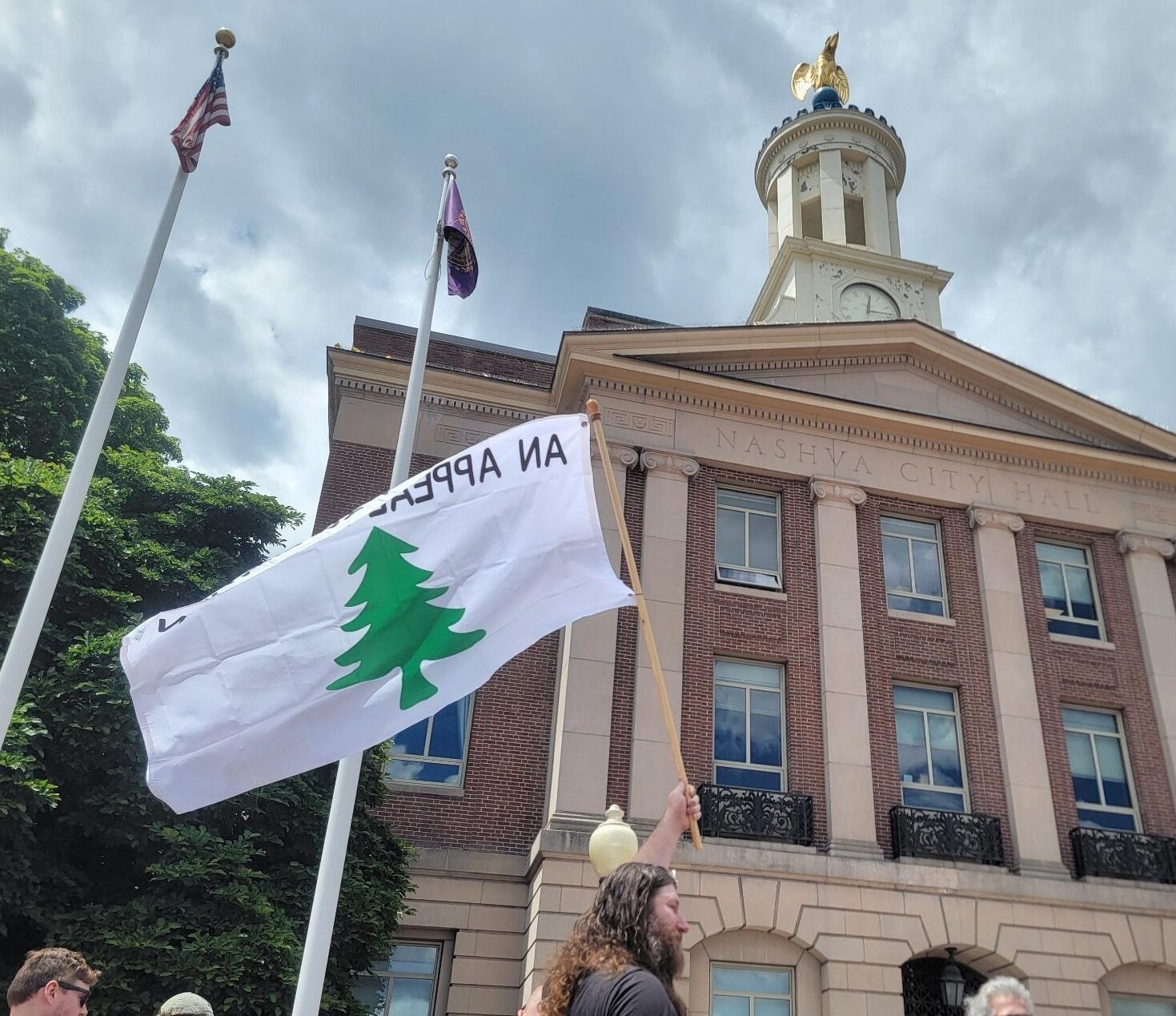Hit with a free speech lawsuit for denying residents the ability to fly a historical, patriotic flag at City Hall, Nashua Mayor Jim Donchess seemingly retreated by repealing the public flag pole policy.
The repeal isn’t a white flag, the city’s attorneys insist. But lawyers for the residents who’ve brought the lawsuit say it’s a bait and switch to avoid legal peril.
Nashua resident Beth Scaer filed her lawsuit last month after the city refused to allow her to fly a Pine Tree Riot flag on City Hall’s “Citizen’s Flag Pole.” In its rejection statement, the city said the Pine Tree Flag, and a “Protect Women’s Sports” flag she attempted to fly previously, were “not in harmony with the message that the city wishes to express and endorse.”
After the lawsuit was filed, Donchess quietly ended the city’s long tradition of having a public flagpole, declaring that in the future, Nashua’s government would decide what flags would and wouldn’t fly and do so without community involvement.
But that repeal, done without any public input or approval from the city’s Board of Alderman, isn’t enough to get out of legal trouble, insists Scaer’s attorney, Nathan Ristuccia, with the Institute for Free Speech.
“This abrupt change is a transparent attempt to avoid judicial scrutiny, but it cannot moot the Scaers’ claim for injunctive relief,” Ristuccia said in a court filing this week.
Ristuccia said the repeal was simply cover for Nashua to engage in censorship by silencing the views of residents who do not walk in lock-step with the administration. But repealing the policy doesn’t fix anything, he wrote. In fact, Nashua and Donchess have said they don’t plan to stop controlling speech through City Hall, according to Ristuccia.
“If this Court does not grant relief, Defendant Donchess could restore the old policy just as easily as he repealed it. Indeed, a spokesman for Nashua has publicly ‘denied that the mayor had made any change to the cityʼs flagpole policy’ and stated that Donchess was ‘merely clarifying the existing policy,’” Ristuccia states in his motion.
Those statements were made to NHJournal by Steven A. Bolton, the city’s corporation counsel.
The existing policy for City Hall Plaza Events uses the same language as the now-repealed flag policy in order to control the message people are allowed to express, according to Ristuccia.
“Defendants use a City Hall Plaza Events policy that is almost identical to the 2022 flag policy … Ceremonies at the City Hall Plaza are permitted only if the ceremony’s message is ‘in harmony with city policies and messages that the city wishes to express and endorse’ and in ‘the City’s best interest,’” Ristuccia wrote.
The lawsuit stems from Scaer’s request to fly what is known as the “Appeal to Heaven” flag, featuring that phrase (from philosopher John Locke) and a pine tree. The pine tree is also a reference to the 1772 Pine Tree Riot, which took place in Weare, N.H., and is widely viewed as one of the first skirmishes in the American Revolution.
City officials denied the request, but they did not explain why they found the flag objectionable.
The Citizen Flag Pole in Nashua allowed any resident to apply for a permit to fly a flag at City Hall. Past flags have celebrated Pride Month, Indian Independence Day, Brazilian Independence Day, Greek Independence Day, International Francophonie Day, and the anniversary of the founding of Nashua’s Lions Club.
But Scaer says the city started censoring her in 2020 when her flag with the message “Save Women’s Sports” was removed after flying for one day due to complaints from City Councilor Jan Schmidt. In February, she was again denied when she sought to fly a flag supporting people who detransition after a sex change procedure. The denial stated the message was “not in harmony with the message that the City wishes to express and endorse.”

